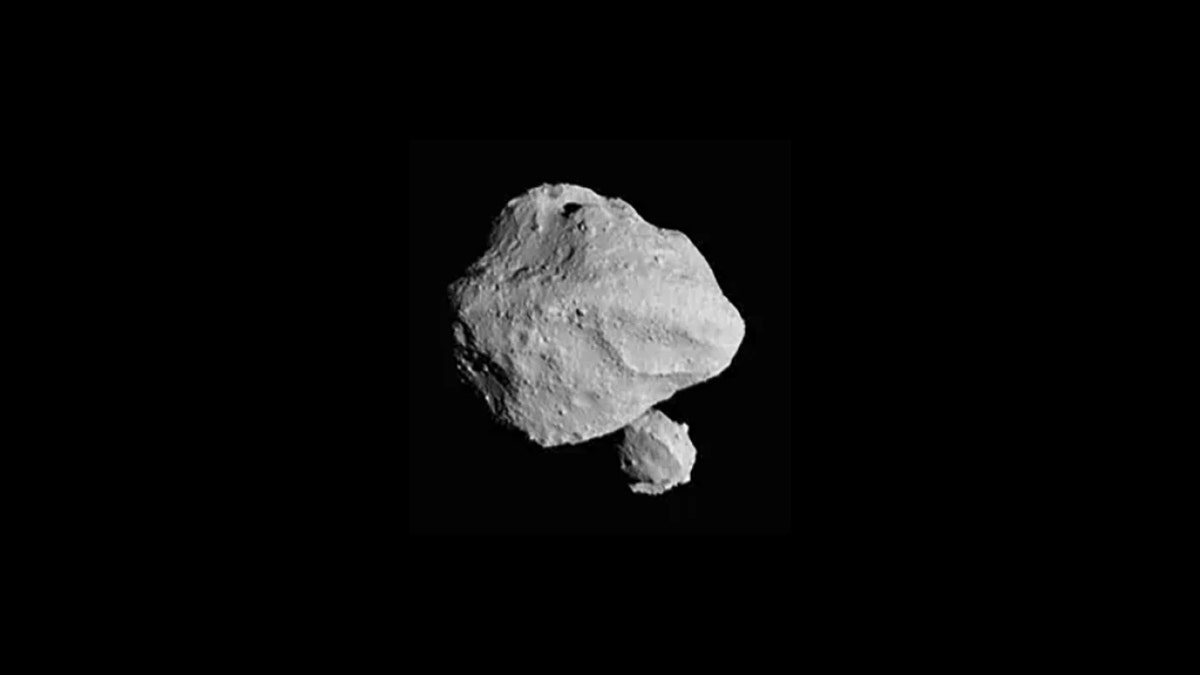NASA preps to send humans back to the moon
Former astronaut Tom Jones explains how the United States' goal in space is different decades later on 'America Reports.'
NASA’s Lucy spacecraft, which was launched in October 2021 to research Jupiter’s asteroids, snapped a picture of a smaller asteroid near Mars last week, which presented scientists with a shocking surprise.
The asteroid Lucy snapped a picture of is named Dinkinesh, and it turns out the space rock has a dinky moon orbiting it.
The Associated Press reported that the discovery was made when Lucy conducted a flyby of Dinkinesh in Mar’s main asteroid belt, nearly 300 million miles away.
NASA SPACECRAFT CATCHES ‘EERIE FACE’ ON JUPITER

This photo provided by NASA shows a photo taken by the Lucy spacecraft during Wednesday, Nov. 1, 2023 flyby of asteroid Dinkinesh, 300 million miles from Earth. It turns out Dinkinesh, which is only a half-mile across, has a dinky sidekick ... just one-tenth of a mile across. This little companion was a surprise to everyone. ((NASA via AP))
The picture was reportedly taken when Lucy was 270 miles away from Dinkinesh, then sent the data and images back to earth.
The findings included Dinkinesh’s size, which was just barely a half-mile across, and its tiny moon, about a tenth-of-a-mile across.
The mission to snap pictures of Dinkinesh was a rehearsal for a much bigger mission, which is to look at the mysterious asteroids near Jupiter.
NASA PUBLISHES NEVER-BEFORE-SEEN PHOTOS OF 'RAVIOLI' MOON ORBITING SATURN

A United Launch Alliance Atlas V rocket with the Lucy spacecraft aboard is seen in this 2 minute and 30 second exposure photograph as it launches from Space Launch Complex 41, Saturday, Oct. 16, 2021, at Cape Canaveral Space Force Station in Florida. Lucy will be the first spacecraft to study Jupiter's Trojan Asteroids. Like the mission's namesake – the fossilized human ancestor, "Lucy," whose skeleton provided unique insight into humanity's evolution – Lucy will revolutionize our knowledge of planetary origins and the formation of the solar system. (Credits: NASA/Bill Ingalls)
The 12-year-long mission, which launched on Oct. 16, 2021, is the first mission to the Jupiter asteroids.
The asteroids are in orbits around the sun and are the same distance as Jupiter.
Lucy is expected to reach the first of the so-called Trojan asteroids in 2027 and explore them for at least six years. What started as a list of seven asteroids to research has grown to 11.
The name Dinkinesh means "you are marvelous" in the Amharic language of Ethiopia. It is also the Amharic name for Lucy, the 3.2-million-year-old remains of a human ancestor found in Ethiopia in the 19702, for which the spacecraft is named.
"Dinkinesh really did live up to its name; this is marvelous," Southwest Research Institute’s Hal Levison, the lead scientist, said in a statement.
The Associated Press contributed to this report.

